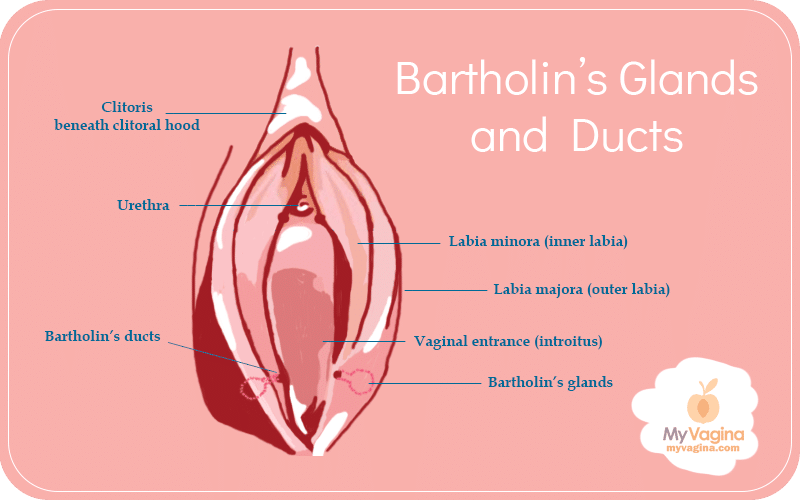The Bartholin’s glands (also known as the greater vestibular glands) are two tiny glands sitting just inside the labia minora (the inner labia), near to the vaginal entrance.1
The Bartholin’s glands produce moisture to the outer section of your vagina – the vulva and vestibule – when you are sexually aroused and a little during the day to keep the vulva moist.
The tubes open up next to the vaginal opening, and are 1.5-2cm in length, called Bartholin ducts. The glands are pea-sized, buried beneath your vulva, with access to the outside world via ducts.

These glands are what make you wet when you are turned on, making it far easier to insert a penis, toy or finger into your vagina for sexual stimulation.
Bartholin’s cysts and abscesses
These glands and ducts can sometimes get infected or blocked. Bartholin cysts arise from blockages, also known as bartholinitis. If the cyst becomes infected, it is then called a Bartholin abscess, however, an abscess can occur without a cyst being present.
Abscesses are far more common than cysts. Cysts can form when the fluid these glands produce blocks the exit point. This blockage can cause swelling, pain and redness, resulting in problems walking, sitting or moving around, but may also have no symptoms.
Sometimes a cyst or abscess will get so big that it bursts and drains spontaneously. Bursting may result in immediate relief.
Smaller cysts may resolve on their own, with larger or symptomatic cysts likely requiring medical intervention.
Treatments for Bartholin’s cysts include surgical draining, removal, or treatment with a CO2 laser. Sitz baths can help.2–4
Read about Bartholin gland cysts and abscesses
Bartholin’s gland cancer
Cancer of the Bartholin’s glands are rare, and even more rare is the development of benign tumours and overgrowth of cells (hyperplasia).5
What else could it be?
- Gartner duct cyst
- Skene’s gland or duct cyst
- Sebaceous cyst
- Vestibular mucosal cyst
- Canal of Nuck cyst
- Leiomyomas fibroma
- Hernia
- Hidradenoma
- Hematomas
- Lipomas
- Endometriosis
- Syringoma
- Accessory breast tissue
- Folliculitis
- Urethral diverticula
- Hidradenitis suppurativa
- Chancroid
- Gonorrhoea
- Syphilis
- Vaginitis
- Genital warts
- Bartholin’s gland cyst, abscess or cancer
References
- 1.Lee MY, Dalpiaz A, Schwamb R, Miao Y, Waltzer W, Khan A. Clinical Pathology of Bartholin’s Glands: A Review of the Literature. Current Urology. Published online May 2015:22-25. doi:10.1159/000365683
- 2.Omole F, Simmons B, Hacker Y. Management of Bartholin’s duct cyst and gland abscess. Am Fam Physician. 2003;68(1):135-140. https://www.ncbi.nlm.nih.gov/pubmed/12887119
- 3.Sośnik H, Sośnik K, Hałoń A. The pathomorphology of Bartholin’s gland. Analysis of surgical data. Pol J Pathol. 2007;58(2):99-103. https://www.ncbi.nlm.nih.gov/pubmed/17715676
- 4.Li HY, Ding DC. Huge Bartholin’s cyst managed by primary marsupialization: A case report. World J Clin Cases. Published online November 6, 2023:7732-7737. doi:10.12998/wjcc.v11.i31.7732
- 5.Addley S, Sadeghi N, Smyth SL, Johnson C, Damato S, Soleymani majd H. Bartholin’s gland carcinoma—the diagnostic and management challenges of a rare malignancy—a case report and review of current literature. Transl Cancer Res. Published online January 2023:201-208. doi:10.21037/tcr-22-612






